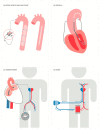Mechanical Circulatory Support Devices for the Treatment of Cardiogenic Shock Complicating Acute Myocardial Infarction-A Review
- PMID: 36079170
- PMCID: PMC9457021
- DOI: 10.3390/jcm11175241
Mechanical Circulatory Support Devices for the Treatment of Cardiogenic Shock Complicating Acute Myocardial Infarction-A Review
Abstract
Cardiogenic shock complicating acute myocardial infarction is a complex clinical condition associated with dismal prognosis. Routine early target vessel revascularization remains the most effective treatment to substantially improve outcomes, but mortality remains high. Temporary circulatory support devices have emerged with the aim to enhance cardiac unloading and improve end-organ perfusion. However, quality evidence to guide device selection, optimal installation timing, and post-implantation management are scarce, stressing the importance of multidisciplinary expert care. This review focuses on the contemporary use of short-term support devices in the setting of cardiogenic shock following acute myocardial infarction, including the common challenges associated this practice.
Keywords: acute myocardial infarction; cardiogenic shock; mechanical circulatory support.
Conflict of interest statement
The authors declare no conflict of interest.
Figures
Similar articles
-
Early Impella Support in Postcardiac Arrest Cardiogenic Shock Complicating Acute Myocardial Infarction Improves Short- and Long-Term Survival.Crit Care Med. 2021 Jun 1;49(6):943-955. doi: 10.1097/CCM.0000000000004915. Crit Care Med. 2021. PMID: 33729726
-
Utilization of Percutaneous Mechanical Circulatory Support Devices in Cardiogenic Shock Complicating Acute Myocardial Infarction and High-Risk Percutaneous Coronary Interventions.J Clin Med. 2019 Aug 13;8(8):1209. doi: 10.3390/jcm8081209. J Clin Med. 2019. PMID: 31412669 Free PMC article. Review.
-
[Reperfusion therapy and mechanical circulatory support in patients in cardiogenic shock].Herz. 1999 Oct;24(6):448-64. doi: 10.1007/BF03044431. Herz. 1999. PMID: 10546149 Review. German.
-
Cardiogenic Shock and Temporary Mechanical Circulatory Support.Crit Care Nurs Q. 2022 Jul-Sep 01;45(3):218-224. doi: 10.1097/CNQ.0000000000000406. Crit Care Nurs Q. 2022. PMID: 35617088 Review.
-
Mechanical circulatory support in cardiogenic shock.Eur Heart J. 2014 Jan;35(3):156-67. doi: 10.1093/eurheartj/eht248. Epub 2013 Sep 7. Eur Heart J. 2014. PMID: 24014384 Review.
Cited by
-
Prognostic Value of the Advanced Lung Cancer Inflammation Index Ratio in Patients with Acute Myocardial Infarction Complicated by Cardiogenic Shock: A Cohort Study.Rev Cardiovasc Med. 2024 Jul 18;25(7):267. doi: 10.31083/j.rcm2507267. eCollection 2024 Jul. Rev Cardiovasc Med. 2024. PMID: 39139443 Free PMC article.
-
Ventricular Septal Rupture as a Complication of Acute Myocardial Infarction: Clinical Characteristics and Prognostic Comparison of Different Treatment Methods.Anatol J Cardiol. 2025 Jan 7;29(3):132-8. doi: 10.14744/AnatolJCardiol.2024.4674. Online ahead of print. Anatol J Cardiol. 2025. PMID: 39763315 Free PMC article.
-
Does Albumin Predict the Risk of Mortality in Patients with Cardiogenic Shock?Int J Mol Sci. 2023 Apr 17;24(8):7375. doi: 10.3390/ijms24087375. Int J Mol Sci. 2023. PMID: 37108536 Free PMC article.
-
Clinical implications of septic cardiomyopathy: A narrative review.Medicine (Baltimore). 2024 Apr 26;103(17):e37940. doi: 10.1097/MD.0000000000037940. Medicine (Baltimore). 2024. PMID: 38669408 Free PMC article. Review.
-
Cardiogenic shock etiology and exit strategy impact survival in patients with Impella 5.5.Int J Artif Organs. 2024 Jan;47(1):8-16. doi: 10.1177/03913988231214180. Epub 2023 Dec 5. Int J Artif Organs. 2024. PMID: 38053245 Free PMC article.
References
-
- Osman M., Syed M., Patibandla S., Sulaiman S., Kheiri B., Shah M.K., Bianco C., Balla S., Patel B. Fifteen-Year Trends in Incidence of Cardiogenic Shock Hospitalization and In-Hospital Mortality in the United States. J. Am. Heart Assoc. 2021;10:e021061. doi: 10.1161/JAHA.121.021061. - DOI - PMC - PubMed
-
- Kolte D., Khera S., Aronow W.S., Mujib M., Palaniswamy C., Sule S., Jain D., Gotsis W., Ahmed A., Frishman W.H., et al. Trends in Incidence, Management, and Outcomes of Cardiogenic Shock Complicating ST-Elevation Myocardial Infarction in the United States. J. Am. Heart Assoc. 2014;3:e000590. doi: 10.1161/JAHA.113.000590. - DOI - PMC - PubMed
Publication types
LinkOut - more resources
Full Text Sources


